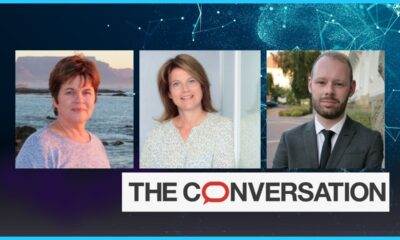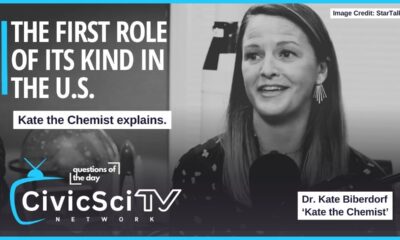Stories in Science Special Series
Moments: My Daughter’s Journey in Science as a Father
People always ask me how my daughter Amoy got into science. My first thought typically: “Is there an actual event that I can pinpoint?” Was there one particular thing I could isolate and say, “this was the moment.” There were definitely several defining moments I can think back to. Moments like when she would put on her mother’s stethoscope and pretended to listen to your pulse.

Davin Shepherd is the father of Amoy Antunet who is a second-grader from Atlanta, Georgia. Amoy is passionate about science, and with the help of her father, she makes videos on several neuroscience related topics and posts them to her Facebook page, Science For Children. Below, Mr. Shepherd shares his perspective as a father who is witnessing his daughter’s exploration and discovery of neuroscience.
People always ask me how my daughter Amoy got into science. My first thought typically: “Is there an actual event that I can pinpoint?” Was there one particular thing I could isolate and say, “this was the moment.” There were definitely several defining moments I can think back to. Moments like when she would put on her mother’s stethoscope and pretended to listen to your pulse. Moments like, three-year old Amoy sitting there listening to me go over notes for a Biology exam. She would mimic my words back to me and laugh. These are always the times when a parent looks at their child and says “you are going to be a doctor one day.” Still I didn’t make anything out of it. Most people referenced Amoy as a pretty baby because that is what they saw. Yet what would beauty be without brains? There are a bunch of pretty children out there, who will one day grow old and fail to leave their footprint on the planet if their parents never nurtured their goals.

Then there were moments like when I brought home a microscope that Amoy always found herself hanging around. When I took it out of the box, she was in awe. It was Daddy’s new toy and she wanted to play too. She wanted so badly to be able to touch it that she was always very careful to follow instructions when I let her operate it. I guess she wanted to show me that she respected the equipment. It wasn’t long before she was able to operate it independently. She knew how insert the slides and then correctly get it into focus. She would go from slide to slide, just looking, and asking questions. She would always go outside with fresh slides, then come back into the house with two or three new things to look at under the microscope. It was safe to say that she was fascinated by looking at things at the microscopic level. It wasn’t long before I realized that I would have to get a microscope for her as well.
I remember her telling me that an adult told her that her father was brain washing her, to which she replied “you should wash your brain too” (with the utmost innocence).
Then there were moments like buying her little science-oriented toys. This included The Squishy Body, The Magic School Bus Science Kits, PH kits, and of course many of the very cool Doc McStuffins- paraphernalia. We would do science experiments together. These kits usually kept her very busy. It would provide valuable play time for us to both learn and play simultaneously. Her very first video was a PH test. She had little PH strips, an electronic PH meter, some test tubes and some liquids.
She sat there at the kitchen table dipping her strips into various liquids to determine its PH level. I recorded it because I thought it was cute that she was presenting like an instructor. I remember Amoy taking her PH testing kit to school to show it to her classmates. She would come home baffled that they were not interested in it. She said the kids thought she was weird. I told her not to worry about what they thought. I remember her telling me that an adult told her that her father was brain washing her, to which she replied “you should wash your brain too” (with the utmost innocence).
There were moments like the time I was studying the heart. I had an actual heart model. It wasn’t a very intricate heart model. However, it still had enough moving pieces that it definitely helped with learning orientation. I remember Amoy being so fascinated by the heart model that she asked for her own. One day she asked me to record her showing the heart model. And so was the inception of Amoy doing video tutorials. She was now four years old at the time. She then started to get more inquisitive about the function as opposed to the form. She wanted to know more about what made the heart pump blood. She began to watch a bunch of YouTube videos on her tablet, read books, and ask a thousand questions.
Now make no mistake; she was still very much a child. She liked to play with dolls, hide and seek, etc. Still, she found time to explore her passion for science. At this point, it was not much of a surprise to me anymore as I began to realize that she was definitely serious about learning science. She would even proclaim that she was a scientist. Who was I to tell her otherwise? We ended up shooting a series of videos covering the heart.
One of the videos covered cardiac conduction, which would segue her fascination in neuroscience. We concluded the heart study with a dissection. I remember almost vomiting during the dissection because my stomach just isn’t designed for things like that, but I toughed it out for Amoy’s sake. She definitely had no problem dealing with it, or that smell that came from whatever they used to preserve the cow’s heart.
There were several moments like when the doorbell rings. You open the door to a package on the porch. All of a sudden, the five -year old (Amoy) comes running around the corner yelling “Is that package for me?” The package was definitely for her. My mother had apparently ordered Amoy a model brain. It had so many pieces to it. It was quite complex and would prove to keep her busy for hours on a day. Naturally, she began by attempting to identify the parts of the brain and their functions. Then she wanted to study the brain at a cellular level and became interested in the physiology of the synapse. I think the most defining moment was when she learned the story of Phineas Gage. A railroad foreman who had an accident that opened one of the floodgates in neuroscience research. She was still five at this point.
Her next video focused on the twelve cranial nerves. I even remember her sitting there using Play Dough to build a model neuron. She would always pop quiz me on the events at the neuro-muscular junction, and the reflex arc. During this time Amoy began to set up her room like a Lab. With the help of my mother, she started to gather all kinds of equipment to add to her lab. She is still building it to this day and takes birthday and Christmas opportunities to ask for science equipment of her choice.
This experience as a father has been very rewarding. Amoy is progressively becoming who she is supposed to be. I am always grateful for the experience of raising her. I think some children just know what it is they want to be in life. Some of them will wait and take a longer progressive route while some wish to begin their journey immediately. There was never one defining moment, but more a compilation of moments that painted the picture of her goal.
Related Reading
BBC: The 7-year-old neuroscientist wowing the internet
Facebook Page: Science for children with Amoy AntuNet
The CS Media Lab is a Boston-anchored civic science news collective with local, national and global coverage on TV, digital print, and radio through CivicSciTV, CivicSciTimes, and CivicSciRadio. Programs include Questions of the Day, Changemakers, QuickTake, Consider This Next, Stories in Science, Sai Resident Collective and more.

-
 Audio Studio1 month ago
Audio Studio1 month ago“Reading it opened up a whole new world.” Kim Steele on building her company ‘Documentaries Don’t Work’
-
Civic Science Observer1 week ago
‘Science policy’ Google searches spiked in 2025. What does that mean?
-
Civic Science Observer1 month ago
Our developing civic science photojournalism experiment: Photos from 2025
-
Civic Science Observer1 month ago
Together again: Day 1 of the 2025 ASTC conference in black and white
Contact
Menu
Designed with WordPress
























